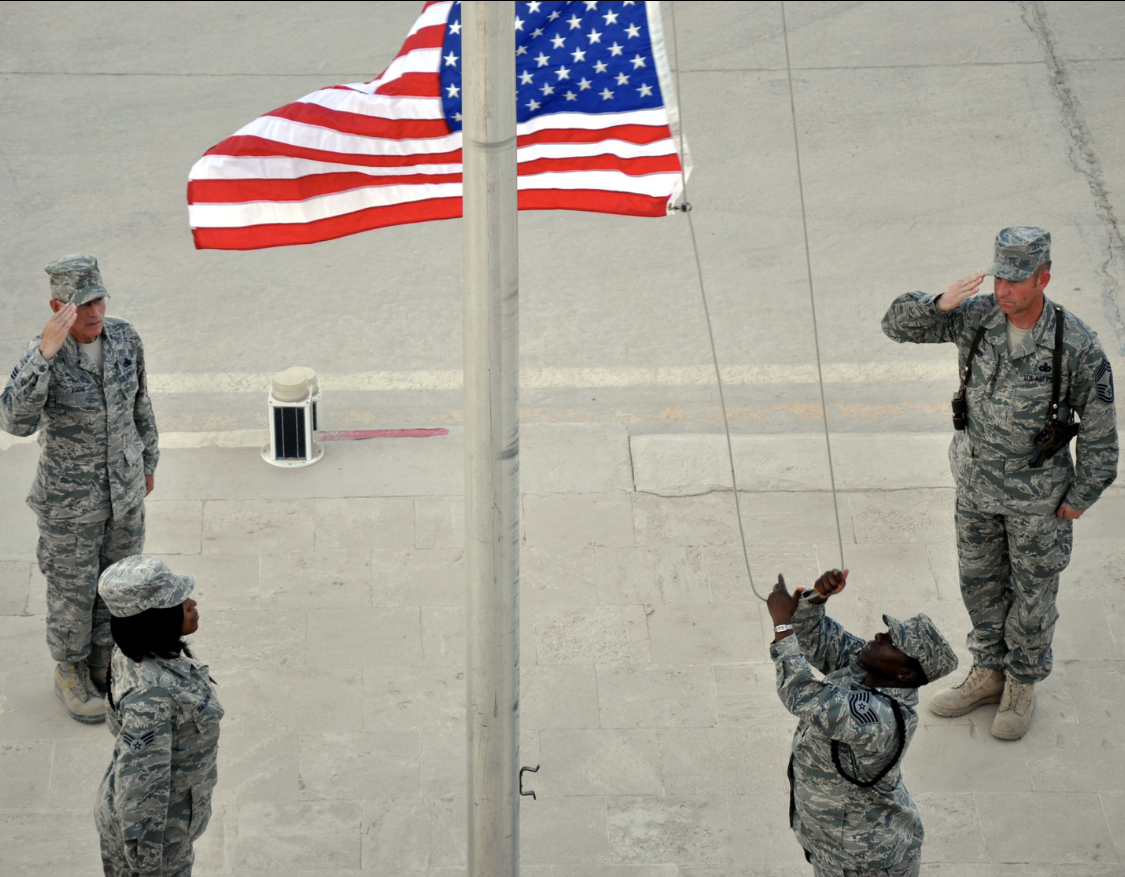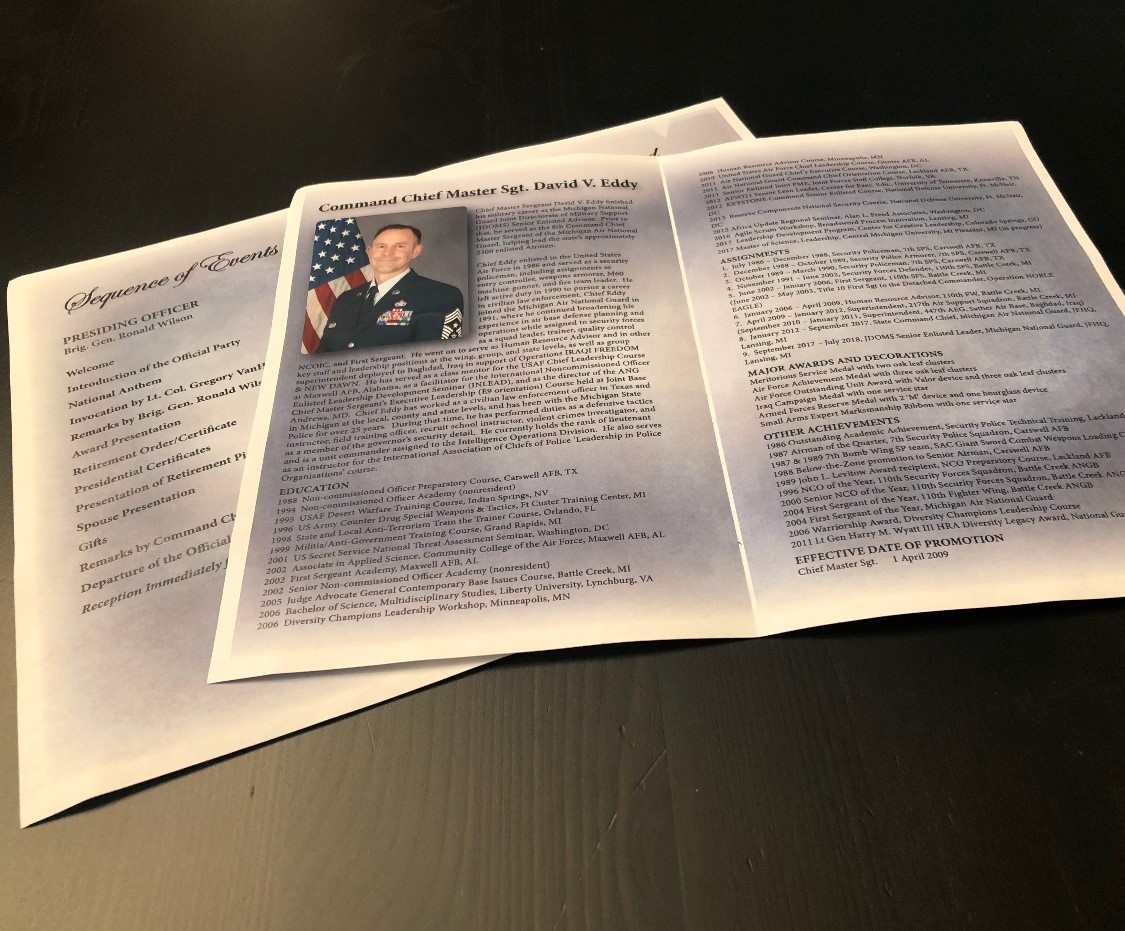I’ve had a number of people ask if my recent retirement speech was recorded. To my knowledge it was not. For this post, I’m sharing the text from which I spoke.
DISCLAIMER: What follows may not contain everything that was said, nor was everything written here necessarily shared during the live recitation. Also please note this is slightly longer than I prefer for posting on this blog. However, I hope you’ll find it worth the extra few minutes to read.

Military retirement speech delivered August 4, 2018 at Battle Creek, Michigan:
When I was young I wanted to be a radio broadcaster like my dad. But after coming to terms with the realization that I look and sound like Howdy Doody, I figured a career in the profession of arms was the next best thing.
I’ve been very blessed over a career that started in 1986. I can tell you honestly that despite some missteps here and there, I always tried to be the very best leader I could be, trying never to forget who I was or where I came from…whether as an M-60 machine gunner; as a fire-team or squad leader; or ‘the enlisted leader’ of 2300 or so Airmen.
During my career(s), I’ve seen and done things many people will never have the opportunity to see or do. Quite frankly, some things no one should see or do. The thing is, when you spend your entire career solving other people’s problems, you tend to ignore your own. And unlike wine or cheese, problems don’t get better with age.
So despite reaching heights I never imagined as an Airman and leader, I’ll tell you honestly that I have not always been the man I should have been. I’m a living example that a person can be quite successful in their life and career, yet still be plagued by unresolved issues or personal demons living in the shadows of their soul. If you knew even half of the dumb things I have done, there’d be about three people in the audience right now.
But I’m glad you’re here to help celebrate my military retirement. And since you ARE here, I’d like to share share some things about a few leaders I’ve known who made a difference in my life & career.

In 1987, and again in 1989, I was selected to compete on the security police team in Strategic Air Command’s Combat Weapons Loading competition ‘Giant Sword’. I’m not going to lie…it was a pretty big deal. And to be picked twice was ‘off the hook’ as the kids say. Do the kids still say that?
After the 1987 competition in Spokane, Washington, I was chosen to toast the Chief Master Sergeant of the Air Force (CMSAF) because I was the lowest ranking person at the table…maybe the whole room. I was a nervous, skinny 20 year old kid trying to speak in a room of about 500 people, with no microphone. I was shaking; my voice was quivering. I felt like a fool. I sat down relieved it was over. A few minutes later, one of the servers came over and handed me a note. It was from CMSAF James Binnicker, the man I had just toasted. If you haven’t figured it out, he was kind of a big deal! The note read “Thanks for the toast, Airman! By the way, your fly is down.” As far as I remember my fly wasn’t down, but he knew I needed to be encouraged. His actions and words revealed the character of his leadership.
Fast forward to 1989. I was the top graduate from NCO prep course; I had been chosen as Airman of the month and of the quarter; I was promoted ahead of my peers (below-the-zone); I had been kicking a**… I mean, I was doing really well on all my job qualification testing. I was on a pretty incredible run for a couple of years, and in case you haven’t figured this out yet, I was kind of a big deal!
So there I am one day somewhere in between all this, leaning against the shack of my assigned flight-line gate when a patrol car rolls up. It’s driven by a NCO I recognized, but he wasn’t in my chain of command and he never impressed me much, anyway. Maybe he hadn’t heard, but I was kind of a big deal. My grandma would have said I was a little too big for my britches…and she’d have been right.
I peeled myself from he side of the shack and sauntered over to his patrol car wearing my best pair of Army gloves (I had my hands in pockets). One DOES NOT do this as a Security Forces Defender. Ever. Especially on post. I casually, borderline disrespectfully, ask “Hey what’s up?”, to which he asks “Why don’t you go over to the other side of the car and ask that?”
I peered through the window as I walked around the back of the car and saw the passenger was Chief Master Sergeant Rochelle. A feared man from Little Rock, Arkansas, Rochelle literally WAS a big deal. I reached his door, snapped to attention, and delivered the requisite reporting statement…”Sir, Airman Eddy reports post Foxtrot Two all secure. Would you like a post briefing?” The chief stared through me and replied ”I was actually stopping to tell you what a great job you’ve been doing lately, but I think I’ll hold off on that for now.” They drove off and left me standing alone at the position of attention in a cloud of dust. I was mortified…what an idiot I was.
A w eek or so later Chief Rochelle came through my entry control point in the weapon storage area. I again snapped to attention and reported my post: “Sir, Airman Eddy reports ECP Whiskey Three all secure, would you like a post briefing…?” I apologized for my miscue during his last encounter with me. He said all kinds of nice things about me and left with “…you’re going to be Chief Master Sergeant of the Air Force someday.”
eek or so later Chief Rochelle came through my entry control point in the weapon storage area. I again snapped to attention and reported my post: “Sir, Airman Eddy reports ECP Whiskey Three all secure, would you like a post briefing…?” I apologized for my miscue during his last encounter with me. He said all kinds of nice things about me and left with “…you’re going to be Chief Master Sergeant of the Air Force someday.”
He knew I needed to be encouraged. His words and actions showed me the character of his leadership.
I left active duty after four years to pursue a career in civilian law enforcement and moved back to Michigan with a pregnant wife and no job. Not one of my wiser life decisions, but we made it work by living in my in-laws’ basement and the generosity of my friend giving me a job driving a grain truck to help with the harvest. I also joined the Air National Guard at this very base.
I worked hard, offered what I could, learned a lot, and ended up in a place I thought I could compete for Wing Command Chief (CCM). I was the only applicant, but ultimately wasn’t selected. I was pretty devastated. Not long after, Chief John Kemp, a former Wing CCM and long-time friend and mentor, stopped in my office and laid a set of his own CCM stripes on my desk. He looked me in the eyes and said “Don’t give up…it will happen when it’s time.”
Chief Kemp knew I needed to be encouraged. His words and actions showed me the character of his leadership.

Each of those men essentially told me what I understand Bill Parcells said to Tony Romo after he botched the snap on a field goal attempt that would have sent the Dallas Cowboys to the next round of the 2007 playoffs: “Don’t let the fumble define you.”
Romo needed to be encouraged. Parcells’ words and actions showed the character of his leadership.
I never became CMSAF. But I did become enlisted leader at a level I never imagined possible. And my time directing the Air National Guard Chief’s Executive Course (E9 orientation) in Washington, DC provided many chances to visit his office in the Pentagon. I may have even partied on his front lawn at Andrews Air Force Base a few times. So, yeah…
I had a pastor that used to say “Being a Christian isn’t easy, it’s impossible! We can’t do it on our own…that’s why we need a savior.” I feel the same way about life and leadership. It’s NOT easy. In fact, it’s impossible unless you’re surrounded by great people, great friends, and great family. People who support you no matter what; people who don’t love and support you because of who you are…they love and support you in spite of who you are. They are also willing to tell you what you need to hear. They are people who care about you and love you unconditionally. I’ve been blessed with many people like that in my life and both careers – many who are here today.
I want to thank the staff and everyone who put this event together; dignitaries; special guests; childhood friends; coworkers; and all the rest of you who are here, despite knowing the real me. And of course my family.

I’ve talked much longer than I should, but I want to just leave you a few final thoughts.
Former ANG Command Chief Gary Broadbent used to say that ‘everyone messes up, but those same people have done far more incredible things; don’t throw the baby out with the bath water…give them the chance to do more amazing things.’ We need to pick them up, dust them off, recognize their need for encouragement, and remind them the fumble is not what defines them.
A boyhood friend I haven’t seen in decades sent me this message on social media just a few days ago. As far as I know, he’s never served in the military, yet this is the insight he shared:
Congratulations. Thank you for your service.
It’s all cool when it’s pictures on FB and stuff.
Never forget the men and women you served and were deployed with. I am positive you impacted them with your leadership. Look for them at this celebration look them in the eye, shake their hands and give them a hug. Tell them how much they mean to you. There are probably many that you impacted that you weren’t even aware of. Make sure to thank them too.
I hope you future is filled with the laughter of children, loved filled challenge and the growth in love and knowledge of the Wonderful Savior!!
He gets it doesn’t he?
You’re going to think what you will about me. If it’s bad, I certainly deserve it. If it’s good, you’re really very sweet, but perhaps a little bit misguided. I appreciate it nonetheless.
I am going to miss this and all of you. As far as I know, I still have a day job for a few more years, and I’ve started a Life, Leadership and Fitness website and blog you can follow if you’re interested in keeping up with what I’m doing in retirement.
But if you need a character-limited version to remember me by, use this: leader, follower, angel, sinner, gentlemen, wretch, needy, giving, broken, redeemed.
My good friend and retired ANG Command Chief Jim Hotaling used to say this, and I feel the same way: It has been my honor to serve with and help lead the greatest weapon system in the world – the American Airman!
I’m blessed and grateful you all chose to be here with me today, and I am a better man because you’re in my life.
I love you all. Thank you.

*Photos added for blog. Some photos courtesy of Mr. Art Frith, USN (Ret.)






















 Through faith, prayers, amazing staff, rigorous physical and speech therapy, and his incredible resilience, he finally started to look at people, move his lips, and comprehend things again. He gradually improved, spending many months in a wheelchair, followed by a walker (neither of which he uses today). Through God’s amazing healing power, tremendous medical care, his incredible strength, and the loving support of many, he eventually went home. In June 2007, my nephew graduated with honors from high school and later from Michigan Career & Technical Institute.
Through faith, prayers, amazing staff, rigorous physical and speech therapy, and his incredible resilience, he finally started to look at people, move his lips, and comprehend things again. He gradually improved, spending many months in a wheelchair, followed by a walker (neither of which he uses today). Through God’s amazing healing power, tremendous medical care, his incredible strength, and the loving support of many, he eventually went home. In June 2007, my nephew graduated with honors from high school and later from Michigan Career & Technical Institute.
 My nephew’s life has been a case study in both the strength to endure and the strength to overcome mentioned above. He continues to be one of the strongest people I know.
My nephew’s life has been a case study in both the strength to endure and the strength to overcome mentioned above. He continues to be one of the strongest people I know.


 eek or so later Chief Rochelle came through my entry control point in the weapon storage area. I again snapped to attention and reported my post: “Sir, Airman Eddy reports ECP Whiskey Three all secure, would you like a post briefing…?” I apologized for my miscue during his last encounter with me. He said all kinds of nice things about me and left with “…you’re going to be Chief Master Sergeant of the Air Force someday.”
eek or so later Chief Rochelle came through my entry control point in the weapon storage area. I again snapped to attention and reported my post: “Sir, Airman Eddy reports ECP Whiskey Three all secure, would you like a post briefing…?” I apologized for my miscue during his last encounter with me. He said all kinds of nice things about me and left with “…you’re going to be Chief Master Sergeant of the Air Force someday.”

